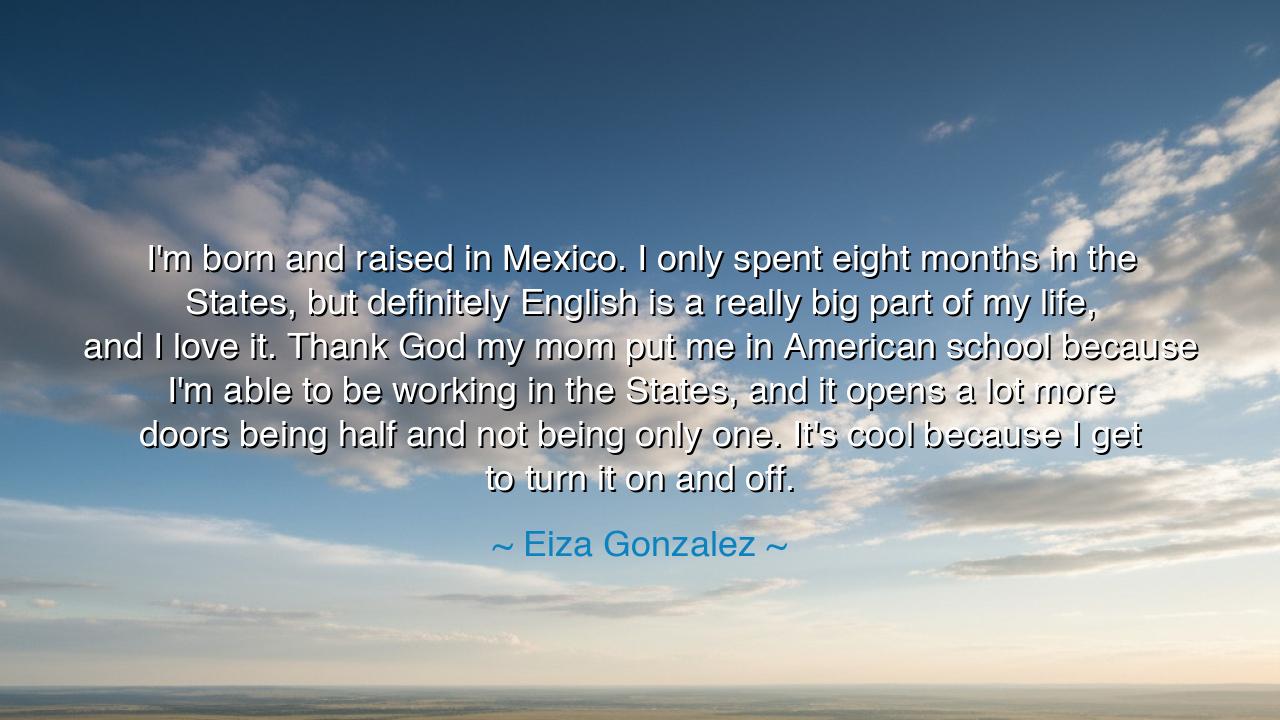
I'm born and raised in Mexico. I only spent eight months in the
I'm born and raised in Mexico. I only spent eight months in the States, but definitely English is a really big part of my life, and I love it. Thank God my mom put me in American school because I'm able to be working in the States, and it opens a lot more doors being half and not being only one. It's cool because I get to turn it on and off.






When Eiza González spoke of her dual identity, stating, “I'm born and raised in Mexico. I only spent eight months in the States, but definitely English is a really big part of my life, and I love it. Thank God my mom put me in American school because I'm able to be working in the States, and it opens a lot more doors being half and not being only one. It's cool because I get to turn it on and off,” she was revealing the profound power of bilingualism and the beauty of navigating between cultures. Her words capture the essence of what it means to live in a world where multiple identities converge, creating opportunities and challenges in equal measure. González's experience reflects not just the ability to speak two languages, but the freedom to move between worlds—cultural and linguistic boundaries that once seemed rigid are now fluid, allowing her to embrace a broader, richer experience.
The ancients understood the power of language and identity as key components of personal and collective growth. Consider Alexander the Great, who, though born in Greece, sought to unify the world through language, culture, and ideas. He encouraged the spread of Greek across the lands he conquered, knowing that a shared language could bridge disparate peoples and bring them closer together. Just as Alexander was able to unify the vast and diverse regions he ruled through communication, so too does bilingualism and cultural adaptability allow individuals like González to forge connections across different worlds. It is not merely a skill; it is a form of power, a key to unlocking opportunity and understanding.
In another example, Julius Caesar, who mastered not just the Roman art of war, but the intricacies of diplomacy and speech, knew that to be successful in foreign lands, one must understand both the language and culture of the people. Like González, Caesar was a product of his own multicultural environment. His ability to navigate between the languages of Rome and the tribes he encountered was essential to his dominance and legacy. To be a leader, one must first understand those who lead, those who follow, and the nuances of their worlds. The ability to “turn it on and off,” as González describes it, is akin to the ancient art of adapting one’s persona to the demands of the moment, to the circumstances and opportunities presented by life.
The concept of multiculturalism and identity is also embodied in the journey of Frida Kahlo, who was born and raised in Mexico, but spent much of her life in Paris, absorbing the culture of the avant-garde. Kahlo’s work, though deeply Mexican in its symbols and style, was also shaped by her time in Europe, where she engaged with modernist movements that would go on to influence her. Like González, Kahlo's ability to move between worlds, to balance her Mexican heritage with European influences, gave her art a unique depth. It is this flexibility—this ability to adapt while retaining the essence of one’s identity—that defines the lives of those who transcend boundaries, whether in art, politics, or business.
Eiza González’s words also point to the privilege of having choices—the ability to be fluid in one’s identity, to embrace both the Mexican and American parts of oneself, and to choose when to emphasize one over the other. This is a modern gift, one not often afforded to those who are confined by geographical or societal limits. Her ability to “turn it on and off” speaks to the profound freedom that comes with having multiple identities—the freedom to navigate between cultures, to speak multiple languages, and to engage with the world on multiple levels. This freedom can open doors that would otherwise remain closed, allowing for greater opportunities and understanding between different peoples.
In the grand sweep of history, we see that adaptability and the ability to embrace multiple identities have often been sources of strength. Mahatma Gandhi, though rooted in the traditions of India, was able to engage with British colonialism on their terms, using the very tools of British political and social structure to dismantle the empire’s hold on India. Gandhi’s ability to understand and operate within multiple cultures, to blend the traditional with the modern, made his mission not just a resistance, but a profound transformation. Like González, Gandhi recognized that being “half” of one thing and “half” of another does not diminish one’s identity; rather, it enriches it, offering a broader spectrum of tools for success.
The lesson here is both profound and practical: embrace the full scope of your identity. Whether you are navigating between cultures, languages, or experiences, do not be afraid to draw strength from every part of who you are. Like Eiza González, Frida Kahlo, Gandhi, and Alexander, you are a product of many influences, and each of them holds the potential to empower you in ways you may not yet fully understand. Celebrate your complexity, and do not fear to move between worlds—for in doing so, you gain a richness of experience that will open countless doors. Let your identity be a bridge, not a barrier, and know that your ability to adapt and embrace diversity will make you stronger, wiser, and more connected to the world around you.






AAdministratorAdministrator
Welcome, honored guests. Please leave a comment, we will respond soon